HealthManagement, Volume 16 - Issue 4, 2016
Affidea is an international healthcare provider focused on advanced diagnostic imaging and cancer care. We are the largest independent provider of these services in Europe, operating 198 medical centres in 15 countries. Despite spanning a multitude of geographies and cultures, the message across Affidea remains constant– nothing is more important than health.
Unification of clinical standards and quality improvement are usually the main focus of interest when considering networked practices. Affidea has a long track record in these, but we also keep investing in the areas that are often considered ‘supplementary’ to clinical practice – those being the physical environment of the medical centres (distinct from the technology housed within) and the attitude of staff members to each other and toward patients (distinct from the direct clinical interaction). A ‘culture of openness’ is an essential component of the latter.
An opportunity for change
The company underwent rebranding two years ago. The new brand provided an opportunity for all employees to be united through the core message that ‘nothing is more important than health’ and one set of guiding values. But how to establish a group-wide project to embed these values into Affidea’s corporate culture? The aim was to deliver on what the brand promises and provide better and more empathetic, patient-centric medical services delivered by the staff within a friendly physical environment across all locations. The rebranding project also afforded an opportunity to unify a previously disparate portfolio of design concepts to provide a unified look and feel as well as improved patient comfort across all medical centres, whilst respecting cultural differences.
A positive physical environment
After extensive engagement with patient focus groups in different countries, a set of interior design concepts were drawn up by an Italian firm. A modular concept was developed that would be compatible with all sizes and layouts of department. The designs were piloted in two centres in different countries. Extensive patient feedback was then provided in each centre to refine the concepts. Examples of the designs are illustrated in figures 1, 2, etc.
Consistency of behavior
In 2015, Affidea decided to design a programme enhancing patient experience by:
• Delivering Affidea Culture Programme – a training explaining Affidea culture and core values and raising the awareness about the importance of the outstanding customer service to all employees (these core values are given in Box 1)
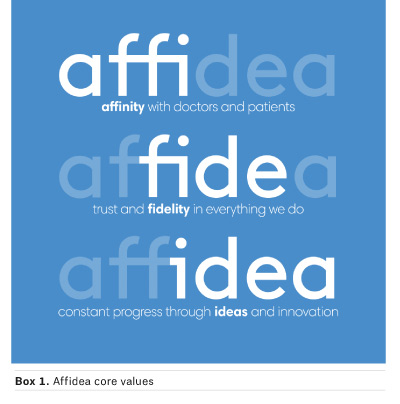
• Designing and launching new standards of patient care delivery and embedding them in existing operational processes
• Aligning Human Resources processes to hire, retain and reward the right people exemplifying in their behavior the Affidea values and patient centric approach
In the initial design of the Programme, Affidea chose a partner from outside the medical sector to learn from those experienced in high class customer service. Partnering with Lausanne Hospitality Consulting, a consulting arm of the Ecole Hôtelière de Lausanne (EHL) experts in hotel management, the Affinity Programme was developed. EHL was founded in 1893 as the first hospitality management school in the world, and was thus well placed to develop the necessary foundation for all the work streams - the Affidea Culture Program, Change Management, Communication and Standardized Operating Procedures (SOP s). The outcome of the design phase was then adapted to meet Affidea’s specific needs and the programme is now being successfully implemented without the help of external partners.
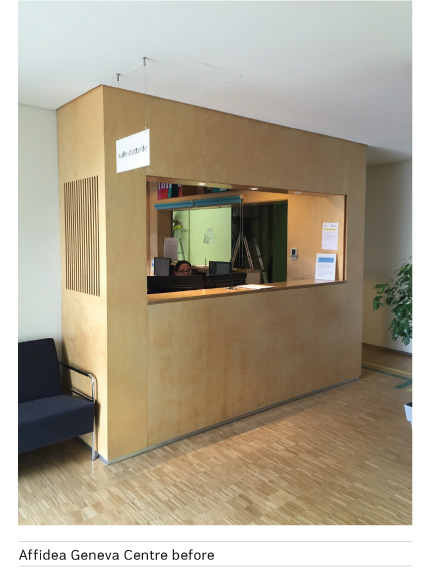 | 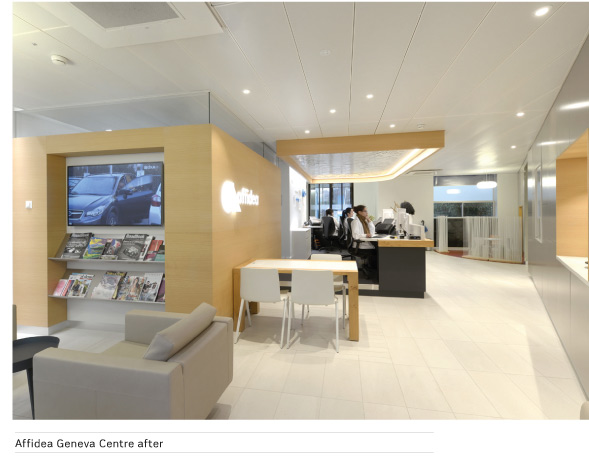 |
In order to embed the new patient care standards and the behavioural change, Affidea decided to introduce designated ‘Affinity Champions’. These champions are Affidea employees who work in patient-facing roles and exhibit excellent customer service behaviour and commitment to upholding Affidea values. They are the role models in patient care who possess and demonstrate predefined competencies that will help them train others on Affinity SOP s on an ongoing basis. Affinity Culture Leader is another role that has been identified and these are those who exhibit change management and influencing skills. They influence, engage and coach employees during the change programme to accept and embrace changes, and also ensure sustainability. The Affidea ‘Book of Affinity’ has been written that incorporates the Affinity SOP s - a repository of all procedures related to delivering excellent customer service in our centres. The book provides directions to all Affidea divisions, medical centres and staff that will enable Affidea to provide uniform, empathetic and high quality customer service.
A culture of openness
Alongside the importance of consistency in behaviour and a beneficial patient environment, Affidea understands that a culture of openness is essential across the group. Although for patients it may seem that a culture of transparency in the health sector is a prerequisite, establishing such a culture is challenging. Scandals keep on occurring in healthcare. Even in systems where policies and pathways are in place, without embedding the correct culture the staff will fail to adequately learn and evolve. Sloane in 2008 provided this excellent summary of the seminal paper ‘To Err is Human’ published by the American Institute of Medicine (IO M) in 1999 - see Box 2.
By putting a culture of openness at the heart of what we do, we will have a chance of becoming a truly learning organization. Of course, the reality of reconciling groups from different cultures and with different priorities to collaborate in an open manner is very difficult. The first steps are to create one set of shared goals and ambitions, to define and establish the processes to educate the staff and to develop the tools to service them. We have created a unified platform to house these SOP s across all of the geographies that we cover, language-specific, and an Affidea Incident Management System (AIMS) to provide a unified and coded method of reporting incidents and more importantly ‘good catches’.
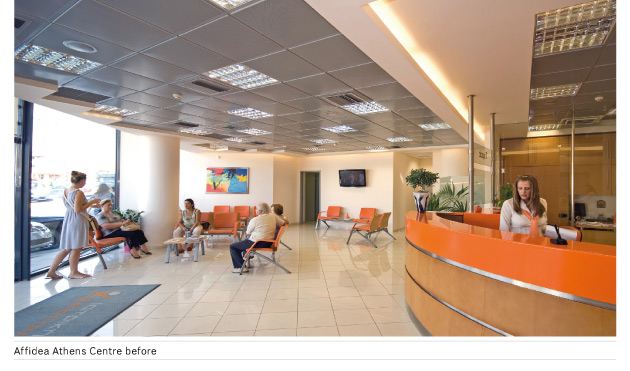 |
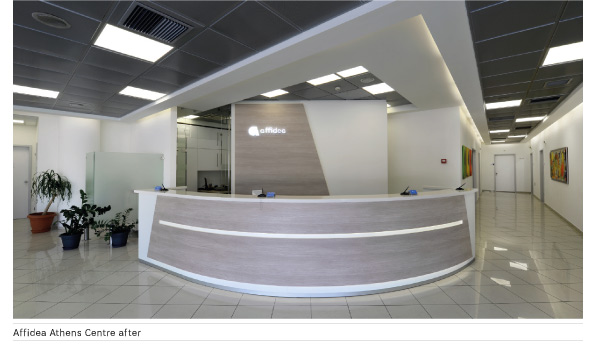 |
Adoption and use of the AIMS platform by all staff members is an indispensable link to the ongoing Affinity project. Although each Affidea country has its own Quality Manager, I would like to empower every staff member to take on this role in their day to day activities. The power and automotive industries have shown that it is entirely possible to embed a culture of openness and safety into an industry – healthcare must follow their example.
Conclusion
The rebranding of Affidea has afforded an unparalleled opportunity to uniformly provide not only an improved physical environment and establish first class patient experience but also establish one organizational culture across the whole international group – this is truly healthcare without borders. The greatest of all these challenges is to bring together a strong corporate identity with a true culture of openness to support clinical excellence.



